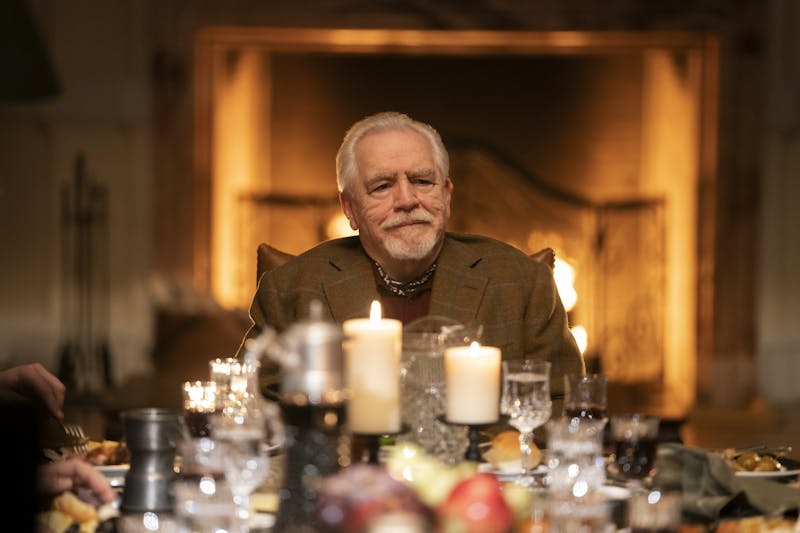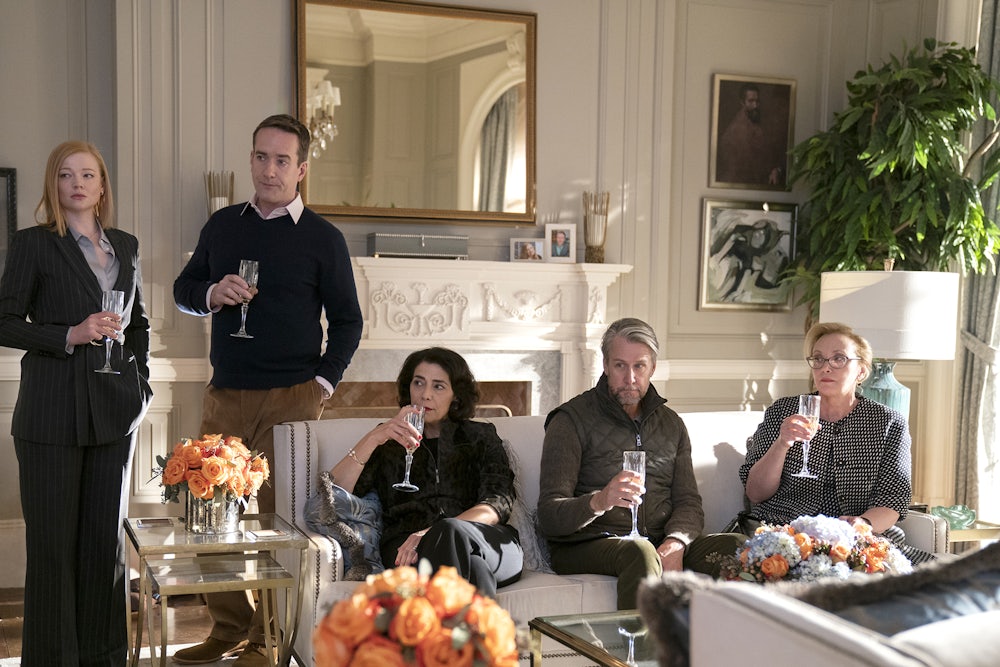The second season of Succession, HBO’s darkly funny drama about billionaire tycoon Logan Roy (Brian Cox) and his restive, grown-up children, opens with an episode called “The Summer Palace,” even though it takes place in the winter. The title refers to the Roys’ Hamptons home, which requires a staff of dozens to maintain, even during the quiet season. As the family travels from Manhattan to Long Island, we see a cadre of laborers dusting off wall sconces, polishing the parquet floors to a glassy sheen. These skittery preparations have a decidedly Upstairs, Downstairs feel to them. Of course, as Succession slyly asserts over and over, there is not a lot of difference between today’s impossibly rich clans and those of the Gilded Age. Money, and the entitlement and blithe misery it brings, transcends space and time: All wealthy families are alike, even if each wealthy family is full of assholes in its own way.
The Roys are gathering for a family meeting, called by Logan, the scowling Rupert Murdoch-esque CEO of the behemoth corporation Waystar Royco, whose crown jewel is a conservative news channel called ATN (think Fox News on steroids). At the end of the show’s first season, a rival financier and his colleagues attempted a hostile takeover of Waystar. Now it’s time to strategize and regroup. Logan has no intention of selling the company he has spent his life building, and needs all his children to join forces against the enemy. This is not an easy task, since each of his children, Connor (Alan Ruck), Kendall (Jeremy Strong), Siobhan or “Shiv” (Sarah Snook), and Roman (Kieran Culkin), believes he or she has a claim to the corporate megafortune and has developed sophisticated ways to sabotage the others and themselves.
Kendall spent much of the first season taking aim at the king and missing. When Logan suffered a stroke early in the season and began behaving erratically, Kendall saw his father’s weakness as an opening for his own ambitions. He rallied enough board members, including his natty, misanthropic younger brother Roman, to push his father out, but when the day arrived, he was stuck in traffic and could not whip up votes over the phone. Soon after, it was Kendall who handed his father the takeover paperwork in a coldhearted act of patricide.
But Kendall quickly lost his advantage, when he and a waiter from the estate went out in search of drugs that same night. The young waiter, high on ketamine, grabbed the wheel from Kendall and steered the car into a river. Kendall managed to free himself but couldn’t save the passenger, and as he flung himself onto a mucky riverbank, in his impeccably tailored suit, he realized that he would never be able to best his dad. By morning, Logan had erased all evidence of Kendall’s involvement with the accident—as only extreme wealth can do—thereby cutting off his son’s insurgency and ensuring his cooperation for life.

At the summer estate, Shiv and Roman plan to take advantage of Kendall’s newly weakened position. Shiv, who has been working as a political strategist for a Bernie Sanders doppelgänger opposed to everything her father believes in, is angling for her chance to leave politics behind and leap into the family business. Roman is snively and rude, somehow a top executive at Waystar despite having no management training or ability whatsoever. As he and Shiv stroll in the sand, he contemplates whether or not his father will choose him as his replacement. “Rom,” Shiv says, with false treacle in her voice. “I think you are a supertalented superstar, and I love you.” Roman looks at her with warmth that quickly melts into disdain. “You’re such a fucking bitch,” he snipes, and walks away.
This is what love is in the Roy family: tactics and maneuvering. The way the Roys express respect is through subterfuge; if someone is worth torpedoing, then they must be doing something right. Logan has kept each of his children in a bubble—of secrecy, of privilege, of self-regard—and in doing so, has done them no favors. In order to feel something, anything, Roman begins a psychosexual liaison with the company’s longtime general counsel, Gerri (J. Smith-Cameron), who is twice his age. She’s the most sensible member of the Roys’ inner circle, but she also seems to relish verbally debasing Roman, calling him a useless little worm over the phone while he masturbates. This is a family in which the sons lust Oedipally after matriarchal figures because they never learned another way.
Succession is the creation of Jesse Armstrong, a British showrunner who worked on the sketch comedy series Peep Show and later collaborated with the satirist Armando Iannucci on The Thick of It, In the Loop, and VEEP. In his work with Iannucci, Armstrong skewered political machinations, exposing the extravagant pettiness behind so much government bureaucracy, from Downing Street to the White House. In Succession, he moves his target to New York, to media and agitprop, to empires that often have a far greater effect on politics than any elected official.
This is a show about rich people. There’s no way around it. While Succession does not glorify wealth, it also makes no apologies for it. The Roys are not like you and me. They have SoHo lofts and trust funds and cashmere everything, and they own theme parks and movie studios and shady cruise lines. They attend free-for-all sex parties in secret warehouses in deep Brooklyn where millionaire men paw at women while taking very pure amphetamines. They have everything anyone could want, but they are all empty and lonesome, neglectful and neglected.
The point of the show is not to garner sympathy for the affluent. What it does is highlight the complete absurdity of wealth, the moral vacuum it creates. It is a drawing room drama about a family who has lost all touch with not just working people but anyone outside of its own inner sanctum. The Roys made their millions by broadcasting a news channel that foments hatred and fear, and yet all the children insist that they don’t watch ATN and consider its far-right propaganda beneath them. But the rhetoric of paranoia has crept into the house either way. Like the Murdochs or the Trumps, the Roys are a family built on controlling the media and also one another, a game that is perilous and often combustible. This is how power works behind closed doors; it’s ugly and divisive, and no one feels safe.
Shiv is ballsy and Machiavellian, Connor is pedantic and distant, Roman is slippery and numb, Kendall is overeager and underprepared. Shiv’s husband, Tom (Matthew Macfadyen), is a Midwestern arriviste who works for the company and is desperate for Logan’s approval. Not one of the children can stand Logan’s third wife, Marcia (Hiam Abbass), a Lebanese-Parisian woman who feels that none of Logan’s kids appreciate him or deserve his compassion. Also tagging along is Cousin Greg (Nicholas Braun), a goofy failson stoner who sweet-talks his way into a job in the first episode and spends the rest of the series deploying a combination of aw-shucks naïveté and careful chess moves to maintain leverage over his hapless relatives.
Greg is the wise fool, the outsider who sees everything clearly, and knows he should back away, but cannot help himself. As a person who was so broke he could not afford shoes before ringing his family’s bell, Greg is intoxicated by the grandeur. But he also never forgets that he is a pawn in a larger game. When Tom, who takes Greg under his wing, enlists him to shred incriminating documents, he saves a few as insurance. In season two, Cousin Greg gets in deeper with the family. He becomes Kendall’s de facto drug dealer (and gains a spacious loft apartment) and he becomes Tom’s right-hand man and punching bag at ATN, which leads to a melodramatic confrontation—involving water bottles and snacks hurled in a fit of anger—when the two are sequestered in a small office after the threat of an active shooter in the building. This brawl takes place in an episode called “Safe Room,” which is a brilliant conceit: Putting the entire family on lockdown allows for several intense dramas to take place at once. Shiv is in the Waystar office building for the day as her father has secretly appointed her his successor. When she slips into the guarded, wood-paneled safe room where guards are protecting her father, she sees that Kendall is orchestrating an off-the-books meeting for Logan with the CEO of a rival news organization called Pierce. The Pierce family is a different kind of dynasty—blue-blooded New Englanders. Together, Kendall and Shiv help their father seal the negotiations while the lockdown stretches on, a rare moment of sibling bonding that can only take place under extreme circumstances in back rooms that no one even knows exist.
In the end, there was no active shooter in the building. A depressed office worker at ATN shot himself at his desk. This is nothing if not a metaphor. The Roys are destructive people. Their organization causes other people to self-destruct. But they are all so removed from the day-to-day agenda that their media empire is pushing, so well-protected by privilege, that they cannot see the harm.
When I started watching Succession, I heard and read the same warning over and over: It gets good around episode five. People told me to stick with it. What I now realize they were saying about the show’s slow burn is that it unfolds like an Edith Wharton novel. The early scenes establish the contours of each lavish room—the velvets, the crystal, the pristine tailoring—so that later, when it all falls apart, you can fully comprehend the destruction.
In The Age of Innocence, Wharton writes of a wealthy family, “In reality they all lived in a kind of hieroglyphic world, where the real thing was never said or done or even thought, but only represented by a set of arbitrary signs.” The same is true of the Roys and their associates. They communicate by glances and sighs. Their language, when they do talk, is rarefied and ridiculous. When the Roys spend a disastrous weekend at the Pierce family estate in an attempt to finalize the buyout, Naomi Pierce, a woman around Kendall’s age, tells him, “Watching you people melt down is the most deeply satisfying activity on the planet.” She speaks for us all. Watching Succession, the old exhortation to “eat the rich” feels redundant. They are already devouring one another and sucking the bones dry.
